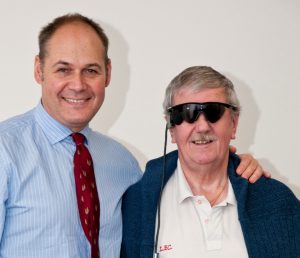Keith was one of three blind patients at Manchester Royal Eye Hospital to be fitted with the revolutionary bionic eye – a device that has helped him to use patterns of light to navigate his world
I was in my 20s when I was diagnosed with retinitis pigmentosa. The doctors explained it was an inherited disease of the retina and that I would lose my sight. Sure enough, only a few years later I couldn’t see anything at all.
But in 2009, I had an operation at Manchester Royal Eye Hospital to have the bionic eye fitted as part of a clinical research trial.
The device includes a tiny camera mounted on some dark glasses that transmits information to an electrode panel implanted in my eye. From there the data is sent along the optic nerve to my brain, allowing me to see flashes of light. When you’ve been sitting in darkness for nearly 30 years that’s a miracle.
What the bionic eye is picking up is the difference between light and dark objects, so even if I can’t see your face, I can tell where you are and that’s made a big difference to my life. Before I had the device fitted, I’d sometimes be talking to someone sitting right next to me and they’d walk away without me noticing, so I’d just be left there talking to myself.

“I have five grand children, whose faces I’ve never seen, but at least I can see them coming now.”
Now I can tell whether there’s someone there, so that doesn’t happen anymore. It also means I can see my grandchildren for the first time. When they come round to see me they wear white t-shirts to help me keep an eye on them. I couldn’t tell you much about what they look like, but at least I can see them coming now!
“If your consultant suggests that the bionic eye may be an option for you, I’d encourage you to consider having the surgery done, so you have the opportunity to experience what I have.”
Manchester Royal Eye Hospital, in collaboration with our clinical research facility, is now running another trial on the bionic eye for people who suffer from Dry Age-related Macular Degeneration, which is a far more common disease than mine that also leads to blindness.